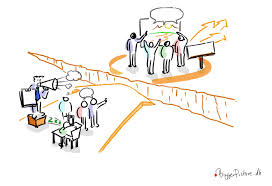Warning: Undefined array key "custom_image_width" in /misc/26/275/122/073/3/user/web/pianesi.com/wp-content/plugins/printfriendly/pf.php on line 1275
Warning: Undefined array key "custom_image_height" in /misc/26/275/122/073/3/user/web/pianesi.com/wp-content/plugins/printfriendly/pf.php on line 1276
3 of a series of 3 on Systems Thinking
You are the leader of this team. In your last staff meeting, in the last 10 minutes the following conflict erupts:

We do have the option to ignore the behavior: left untapped it might very well create a risky rift between team members and compromise future work together. If we can resist the tentation to squelch the conflict and not have the guts to attend to it, it might be helpful to ask yourself and – sometime the group:
- What is this emotional outburst really about?
- What is this person seeing, feeling, and experiencing that I am missing?
- What is it about this person’s cultural, ethnic, gender background that would explain his or her unique experience?
- How does this fit with what else I know about this person?
- To what extent is this person distorting or exaggerating what is going on?
- How are others in the group reacting to what is happening?
- What does my intuition tell me is going on?
- What can I do to help this person become more aware of his or her behavior and find connections to the past?
- Who might this group member represent for the rest of the group?
- What are the intrapersonal needs that are trying to be met through this exchange?
- What do I need to do to work this through toward closure in the group?
- What object lessons can be generalized from this single episode to other group members’ experiences?
One of the exciting things about a group setting is the chance to discover and work through some of the apparent trouble together. Often the best way to address this is to use other group members to test your assumptions. This is often achieved by looking for validation from other group members and by comparing one’s interpersonal validations with those of others in the group.
Obviously working like this is only possible if we drop the habit of seeing things as having only one, single cause, and if we approach reality – like a blow up in a group – as a complex event rooted in complex dynamics. Ultimately if we use system thinking as a critical tool for understanding teams.

Adriano understands how to increase your returns on leadership. He works with professionals in world-class organizations that include Philip Morris, Microsoft, the World Bank, Johns Hopkins University, the US Marine Corps, the State Department and NASA. A skilled experiential educator with corporate leadership experience, he is the Founder & Principal Consultant of ParticipAction Consulting, Inc., a firm committed to help clients redefine change, collaboration and power in their organizations. He co-authored "Teachable Moments of Leadership" with Jill Hufnagel in 2016, on a learning methodology that gets results by going from PowerPoint to …powerful!
Adriano Pianesi | adriano@pianesi.com


Recent Comments